Seminole Wars Authority
The Seminole Wars Authority podcast looks at Seminole resistance to the United States’ campaign of Indian removal in the 1800s. We explore what the Seminole Wars were, how they came to be, how they were fought, and how they still resonate some two centuries later. We talk with historians, archaeologists, anthropologists, archivists, writers, novelists, artists, musicians, exhibitors, craftsmen, educations, park rangers, military-era reenactors, living historians, and, to the descendants of the Florida and Oklahoma Seminole who fought tenaciously to avoid US government forced removal. Host Patrick Swan is a board member with the Seminole Wars Foundation. This podcast is recorded at the homestead of the Seminole Wars Foundation -- www.seminolewars.us -- in Bushnell, Fla. Subscribe automatically to the Seminole Wars Authority through your favorite podcast catcher. (Banner photo by Andrew Foster)
The Seminole Wars Authority podcast looks at Seminole resistance to the United States’ campaign of Indian removal in the 1800s. We explore what the Seminole Wars were, how they came to be, how they were fought, and how they still resonate some two centuries later. We talk with historians, archaeologists, anthropologists, archivists, writers, novelists, artists, musicians, exhibitors, craftsmen, educations, park rangers, military-era reenactors, living historians, and, to the descendants of the Florida and Oklahoma Seminole who fought tenaciously to avoid US government forced removal. Host Patrick Swan is a board member with the Seminole Wars Foundation. This podcast is recorded at the homestead of the Seminole Wars Foundation -- www.seminolewars.us -- in Bushnell, Fla. Subscribe automatically to the Seminole Wars Authority through your favorite podcast catcher. (Banner photo by Andrew Foster)
Episodes

Sunday Jun 21, 2020
Sunday Jun 21, 2020
The US Army that began the Second Seminole War was a small one. Congress distrusted large standing armies and disliked the cost for funding them even more. As former Secretary of Defense Donald Rumsfeld famous remarked about a later conflict: “You go to war with the army you have, not the army you might want or wish to have at a later time.” Fortunately, the U.S. Army did not fight unaided.
The US Government saw fit to send in the Marines to assist. Tradition says that the Marine Corps Commandant, Colonel Archibald Henderson, pinned a note to his door: "Gone to Florida to fight the Indians. Will be back when the war is over.”
Joining us today to discuss the historic part that the U.S. Marine Corps played in the Second Seminole War is Dave Eckardt, author of the first book on their mobilization, aptly titled, The U.S. Marines in the Second Creek and Seminole Wars. He is also a Marine re-enactor, seen below sporting the summer uniform, during an event at Fort Foster in Florida, and above in the winter uniform at an exhibition event.
Host Patrick Swan is a board member with the Seminole Wars Foundation. He is a combat veteran and of the U.S. Army, serving in Iraq, Afghanistan, Kuwait, and Kosovo, and at the Pentagon after 9/11. A military historian, he holds masters degrees in Public History, Communication, and Homeland Security, and is a graduate of the US Army War College with an advanced degree in strategic studies. This podcast is recorded at the homestead of the Seminole Wars Foundation in Bushnell, Florida.
Subscribe automatically to the Seminole Wars through your favorite podcast provider, such as iHeart or Stitcher or Spotify, or Pandora or Google podcasts or iTunes, or ...Check it out so you always get the latest episode without delay where and when you want it. Like us on Facebook, LinkedIn, and YouTube!
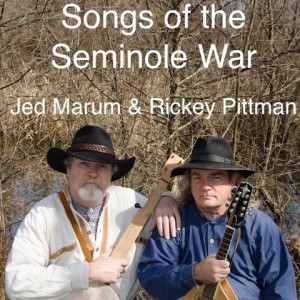
Sunday Jun 14, 2020
SW008 'Bard of the South' Sings of Seminole Wars
Sunday Jun 14, 2020
Sunday Jun 14, 2020
Come to a Florida Wars battle re-enactment or living history event commemorating events of the Second Seminole War and you are likely to hear a balladeer singing Songs of the Seminole War. This is not unusual as the Second Seminole War lends itself especially to meaningful musical interpretation through songs. But this singer departs from convention. Although he is a white, southern, country-and-folk musician, Rickey Pittman assumes the perspective of the Seminole in the songs he co-wrote and recorded with the late Jed Marum. Our guest guides us through the meaning behind their song themes, such as the Battle of Okeechobee, and historical characters, such as the Seminoles' Osceola and Abiaka, and the Dade Battle survivor, soldier Ransom Clark.
Rickey E. Pittman, the "Bard of the South", is a storyteller, author, and folksinger. He was the Grand Prize Winner of the 1998 Ernest Hemingway Short Story Competition. Rickey Pittman presents his stories, music and programs at schools, libraries, organizations, museums, historical reenactments, restaurants, banquets, and Celtic festivals throughout the South. An adjunct college English instructor with an M.A. from Abilene Christian University, Rickey has fourteen published books, four music CDs and several single releases. You can find out more about him at his website: www.bardofthesouth.com (Performance photo of Rickey Pittman and Jed Marum by Heather Burney)
Host Patrick Swan is a board member with the Seminole Wars Foundation. He is a combat veteran and of the U.S. Army, serving in Iraq, Afghanistan, Kuwait, and Kosovo, and at the Pentagon after 9/11. A military historian, he holds masters degrees in Public History, Communication, and Homeland Security, and is a graduate of the US Army War College with an advanced degree in strategic studies. This podcast is recorded at the homestead of the Seminole Wars Foundation in Bushnell, Florida.
Subscribe automatically to the Seminole Wars through your favorite podcast provider, such as iHeart or Stitcher or Spotify, or Pandora or Google podcasts or iTunes, or ...Check it out so you always get the latest episode without delay where and when you want it. Like us on Facebook, LinkedIn, and YouTube!
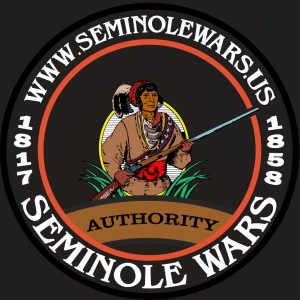
Sunday Jun 07, 2020
SW007 Captain Coe Advocates for the Red Patriots
Sunday Jun 07, 2020
Sunday Jun 07, 2020
In the late 19th century book, Captain Charles Coe wrote a curious treatise called Red Patriots --The Story of the Seminoles 1898. The book, a mixture of history and lobbying, served as an extended plea to the US Government and the American people to understand the Florida Seminole. He viewed them as akin to the Minutemen Patriots of the founding generation, fighters who defended their homeland from a hostile occupying force. Coe's idea was to gain political support for legislation to ensure the remaining Florida Seminoles could be left alone to live on their own lands in the Everglades or anywhere in Florida -- without eviction by property-hunger settlers.
Coe’s great grandson, Andrew Foster, has popularized Coe’s memorable endeavor. Andrew Foster has traveled up and down Florida as a living history speaker and local historian, dressing the part as Captain Coe. He joins us today to discuss Charles Coe -- newspaperman; naturalist; farmer; union printer; genealogist; author; port collector; poet; photographer, amateur archaeologist; small boat captain -- Coe's legacy impact on Seminole and Florida history, and what he himself has learned portraying Charles Coe at talks throughout the state.
Host Patrick Swan is a board member with the Seminole Wars Foundation. He is a combat veteran and of the U.S. Army, serving in Iraq, Afghanistan, Kuwait, and Kosovo, and at the Pentagon after 9/11. A military historian, he hold masters degrees in Public History, Communication, and Homeland Security, and is a graduate of the US Army War College with an advanced degree in strategic studies. This podcast is recorded at the homestead of the Seminole Wars Foundation in Bushnell, Florida.
Subscribe automatically to the Seminole Wars through your favorite podcast provider, such as iHeart or Stitcher or Spotify, or Pandora or Google podcasts or iTunes, or ...Check it out so you always get the latest episode without delay where and when you want it. Like us on Facebook, LinkedIn, and YouTube!

Sunday May 31, 2020
SW006 A Seminole Looks Back...and Forward
Sunday May 31, 2020
Sunday May 31, 2020
This week, we explore the enduring effects of the Seminole Wars on Florida and the USA. Pedro Zepeda, a member of the Seminole Tribe of Florida, is a direct descendant of the Seminole who fought in that war and withdrew to survive and later thrive in the Everglades.
He has been the “face” of the Seminole as a narrator for the annual re-enactment of the Dade Battle in Bushnell each January. He speaks from the heart to inform visitors that the Seminole fought for their livelihoods, their families, and their homes so they could stay in Florida.
Host Patrick Swan is a board member with the Seminole Wars Foundation. He is a combat veteran and of the U.S. Army, serving in Iraq, Afghanistan, Kuwait, and Kosovo, and at the Pentagon after 9/11. A military historian, he holds masters degrees in Public History, Communication, and Homeland Security and is a graduate of the US Army War College with an advanced degree in strategic studies. This podcast is recorded at the homestead of the Seminole Wars Foundation in Bushnell, Florida. (Pedro Zepeda photos by Andrew Foster)
Subscribe automatically to the Seminole Wars through your favorite podcast provider, such as iHeart or Stitcher or Pandora or Google podcasts or iTunes, or ...Check it out so you always get the latest episode without delay where and when you want it. Like us on Facebook and YouTube!
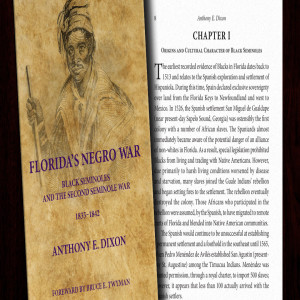
Sunday May 24, 2020
SW005 Second Seminole War as a Florida Negro War
Sunday May 24, 2020
Sunday May 24, 2020
Historians generally accept that the Second Seminole War, from 1835 to 1842 was foremost a war of Indian removal, one to expel Seminole from Florida and relocate them to the Arkansas/Oklahoma Territory west of the Mississippi River. Whether intended explicitly or not, the Second Seminole War also served to enslave Black Seminole captured in the removal process, regardless of objections by the U.S. Army, which at times considered them to be prisoners of war.
A Florida historian contends that the Second Seminole War was driven by American plantation society’s relentless efforts to return (or force into) slavery as many Black Seminoles, if not all, as could be seized. He states he has found evidence that shows shipping African Americans -- Seminole, escaped, or free -- into bondage was not only a major underlying theme throughout the war, but at various points, the primary goal. He states that the Second Seminole War was the largest slave uprising in U.S. history.
Calling in to us to discuss his insights is Dr. Anthony E. Dixon. He is the author of Florida’s Negro War. He is the Founder and President of AHRA, Archival and Historical Research Associates. He has been a Field Director for the Florida African American Heritage Preservation Network, and is an Adjunct Professor of History at Florida A&M University. Learn more at http://www.profaedixon.com/
Host Patrick Swan is a board member with the Seminole Wars Foundation. He is a combat veteran and of the U.S. Army, serving in Iraq, Afghanistan, Kuwait, and Kosovo, and at the Pentagon after 9/11. A military historian, he holds masters degrees in Public History, Communication, and Homeland Security and is a graduate of the US Army War College with an advanced degree in strategic studies. This podcast is recorded at the homestead of the Seminole Wars Foundation in Bushnell, Florida.
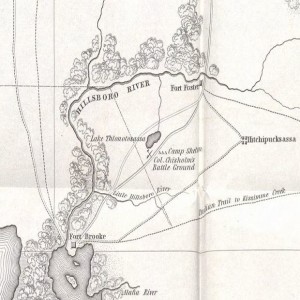
Friday May 22, 2020
SW004 Finding a Lost Battlefield of the Seminole Wars
Friday May 22, 2020
Friday May 22, 2020
A recent Tampa Bay Times article by Paul Guzzo proclaimed, "The location of a great Seminole Wars battle has long been unknown. A Tampa man thinks he found it." The subhead reads: "Two soldiers might have been buried on the site. Records that indicate they were moved to a cemetery are imperfect, so the bodies might still be in their original graves." https://www.tampabay.com/news/military/2020/05/20/the-location-of-a-great-seminole-wars-battle-has-long-been-unknown-a-tampa-man-thinks-he-found-it/
Jeff Hough, who uses modern-day computer mapping techniques to find historic sites, went looking for it. After examining survey maps AND two small mounds possibly holding the remains of two soldiers, he told the Tampa Bay Times he believes he has found it.
Jeff Hough joins us today to discuss his findings and their importance.
Host Patrick Swan is board member with the Seminole Wars Foundation. He is a combat veteran of the U.S. Army, serving in Iraq, Afghanistan, Kuwait, and Kosovo, and at the Pentagon after 9/11. He holds masters degrees in Public History, Communication, and Homeland Security and is a graduate of the US Army War College with an advanced degree in Strategic Studies. This podcast is recorded at the homestead of the Seminole Wars Foundation in Bushnell, Florida.
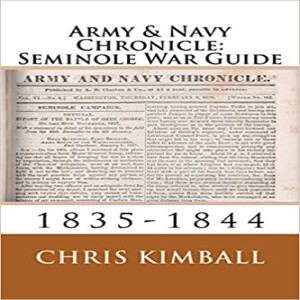
Wednesday May 20, 2020
SW003 A National Newspaper Chronicles the War
Wednesday May 20, 2020
Wednesday May 20, 2020
In its day, the Army and Navy Chronicle was the Army Times for newspaper coverage of the Antebellum Jacksonian expansion of the United States. From 1835 to 1842, the United States embroiled itself in a war that engaged half the United States Army in Florida before it concluded. Volunteer Militias of several states, with support and cooperation with the Navy and Marine Corps, joined the regular Army in an attempt to remove the Native Tribes from Florida in what we call Second Seminole War. The Army-Navy Chronicle covered it every step of the way, documenting eyewitness accounts and serving often as a primary source for news and information about this Florida War.
The Chronicle was an amazing compilation of letters and reports from the battle fields and camps, with other multiple accounts of the same events from different eyewitnesses. There were some who said, “Let us leave this land to the Indians,” while others said, “We are in a war of extermination!” All views are covered and reflect, for better or worse, the biases of their times.
Seminole War Scholar Chris Kimball pulled these back issues from the dusty library shelves, literally and figuratively, reviewed each copy, and wrote a synopsis for every single article or mention of the Second Seminole War. His book is more than an index. It is a revelation.
He joins us to talk about how he did it and why his book is an essential guide to anyone who seeks to understand what the public was reading during America’s longest Indian war.
Host Patrick Swan is board member with the Seminole Wars Foundation. He is a combat veteran of the U.S. Army, serving in Iraq, Afghanistan, Kuwait, and Kosovo, and at the Pentagon after 9/11. He holds masters degrees in Public History, Communication, and Homeland Security and is a graduate of the US Army War College with an advanced degree in Strategic Studies. This podcast is recorded at the homestead of the Seminole Wars Foundation in Bushnell, Florida.
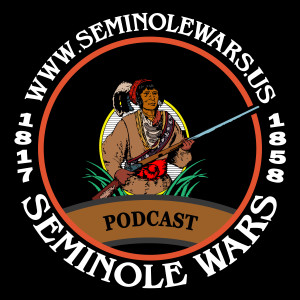
Saturday May 16, 2020
SW001 What were the Seminole Wars?
Saturday May 16, 2020
Saturday May 16, 2020
In the 1800s, the United States Government waged an exhausting military campaign of Indian removal against the Florida Seminole. Various accounts put it in total at between 41 and 46 years in length with periods of hot and cold warfare.
In our inaugural episode, historian and Seminole Wars scholar John Missall joins us to provide an overview of the Seminole Wars: what they were; how they came to be; how they were fought; and how they still resonate with us some two centuries later.
John Missall and with his wife Mary Lou are historians and authors who have written extensively on Florida’s Seminole Indian Wars. Their works include detailed histories, biographies, and two award-winning novels. The couple’s latest books are The Seminole Struggle: A History of America’s Longest Indian War, available from Pineapple Press; and The History of the Third Seminole War, co-authored with Dr. Joe Knetsch, and available from Casemate books. Both works can be found at our Seminole Wars Foundation website at www.seminoleswars.us
Host Patrick Swan is board member with the Seminole Wars Foundation. He is a combat veteran of the U.S. Army, serving in Iraq, Afghanistan, Kuwait, and Kosovo, and at the Pentagon after 9/11. He holds masters degrees in Public History, Communication, and Homeland Security and is a graduate of the US Army War College with an advanced degree in Strategic Studies. This podcast is recorded at the homestead of the Seminole Wars Foundation in Bushnell, Florida.
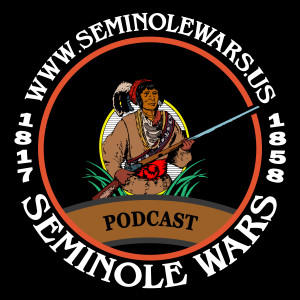
Saturday May 16, 2020
SW002 Removal spawns resistance
Saturday May 16, 2020
Saturday May 16, 2020
In the 1800s, there were three Seminole Wars as defined by the US Government. Each differed in scope, strategy, and tactics but shared the goal of containment and removal of the Seminoles from Florida. The US government’s premise was that native peoples could not coexist with American settlersseeking new land opportunities in Florida. In fact, it was the reverse: American settlers could not – or would not -- coexist with native peoples, such as the Seminole. The US government instituted policies and then military actions to separate the land settlers desired from the Seminole Indians who occupied it. The Seminole resisted vigorously this attempted removal.
Joining us to make sense of this removal and resistance is Brent Weisman. Dr. Weisman is Professor Emeritus of Anthropology at the University of South Florida. He has served as the editor of The Florida Anthropologist, president of the Seminole Wars Historic Foundation and the Alliance for Weedon Island Archaeological Research and Education, and was a founding director of the Florida Public Archaeology Network. His research interests continue to be Seminole Indian culture and history, Florida archaeology, and North American Indians. He is the author of numerous journal articles and books on both the Seminole Wars and the Seminole themselves.
Host Patrick Swan is board member with the Seminole Wars Foundation. He is a combat veteran of the U.S. Army, serving in Iraq, Afghanistan, Kuwait, and Kosovo, and at the Pentagon after 9/11. He holds masters degrees in Public History, Communication, and Homeland Security and is a graduate of the US Army War College with an advanced degree in Strategic Studies. This podcast is recorded at the homestead of the Seminole Wars Foundation in Bushnell, Florida.





